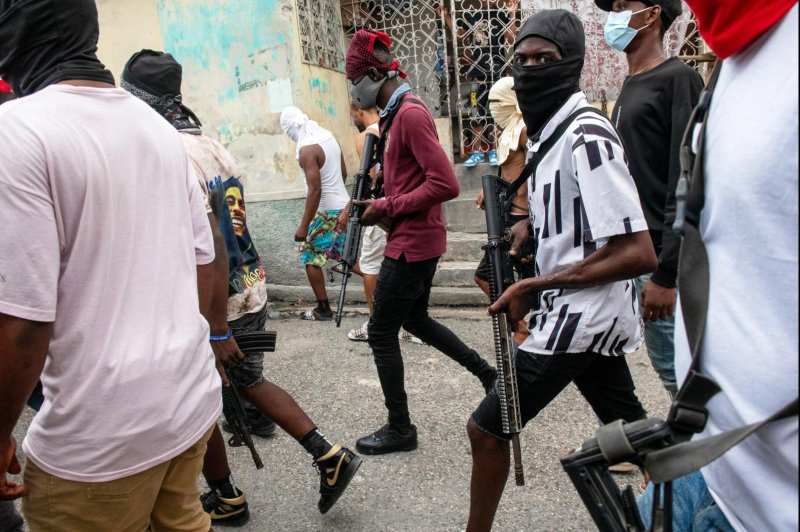Heavily armed and hooded Haitian gang members are shown participating in a protest demanding the removal of Prime Minister Ariel Henry in Port-au-Prince, Haiti, on Sept. 19. The UN Security Council voted Monday to approve a resolution for multinational police action in Haiti to combat rampant gang crime. Photo by Johnson Sabin/EPA-EFE
Oct. 2 (UPI) -- The United Nations Security Council has voted to approve a long-sought resolution that will deploy a multinational security force to Haiti to battle violent and deadly street gangs.
The 15-member Security Council voted Monday in New York with 13 in favor of the yearlong resolution, led by Kenya and authorizing an international police intervention in the violence-plagued Caribbean island nation, with two abstentions from Russia and China.
"Today's decision at the United Nations Security Council to authorize a Multinational Security Support mission for Haiti marks an important milestone in bringing much-needed help to the people of Haiti who have suffered for far too long at the hands of violent criminals," National Security Advisor Jake Sullivan said in a statement.
The resolution, sponsored by the United States, gives the United Nations' blessing to a policing effort led by Kenya and backed by others to stabilize the situation in Haiti, where gang-related violence has escalated and exposed the island's population to what U.N. officials call "extreme and systematic violence."
Kenya has pledged at least 1,000 security personnel to help Haitian National Police guard critical infrastructure, including airports, ports, hospitals, schools and key roadways.
"The global community owes a debt of gratitude to Kenya for answering Haiti's call to serve as the lead nation of the mission, and likewise to the other nations that have pledged to join this mission alongside Kenya, including Jamaica, The Bahamas, and Antigua and Barbuda," Sullivan added. "We thank these nations for their leadership and willingness to bring relief to Haiti."
"It's a very important matter for all Latin American and African countries. The Caribbean countries have been very vocal about the importance they attach to this resolution," Security Council President Sérgio França Danese of Brazil said in a briefing Monday before the meeting.
The Brazilian ambassador stressed that under the resolution, the policing force would not be a U.N. endeavor, but instead would consist of efforts by individual countries opting to participate in the force at the request of overwhelmed Haitian authorities.
"We're asking member states to send in their own citizens into a very difficult and challenging environment with real life-and-death risk," U.N. spokesman Stéphane Dujarric said Monday. "There are political and logistical implications."
On July 29, fully 10 months after Haiti initially requested the help, Kenyan Foreign Minister Alfred Mutua announced in a statement that his country had agreed to "positively consider" leading a multinational force to Haiti.
He indicated Kenya would deploy a contingent of 1,000 police officers "to help train and assist Haitian police restore normalcy in the country and protect strategic installations."
Subsequently, several Caribbean countries, including Jamaica, Barbados, and Antigua and Barbuda, announced they, too, would consider contributing to the force.
U.N. Secretary-General António Guterres in August reiterated his recommendation to deploy a non-UN multinational force to Haiti and said he "welcomed" the announcements of Kenya and countries.
Danese said despite the Security Council's approval of the measure Monday, the government of Kenya would still need to get the assent of the country's parliament to move forward.
"This force is being considered as just one instrument to help stabilize the security situation in the country," he said. "This is just a first step in what we hope will be the direction in terms of assuring those security considerations that will allow the political process to go forward."
"It is a condition that is necessary but, of course, not enough."
The power and violent behavior of gangs in Haiti has been growing in recent months and UN officials say rape and other acts of sexual violence are pervasive throughout many parts of the country.
In August, the U.S. State Department urged U.S. citizens to leave Haiti as soon as possible amid the island's deteriorating security and infrastructure.
Between October 2022 and June, close to 2,800 intentional homicides were recorded in the country, while the number of kidnappings has risen to nearly 1,500 cases, according to the UN secretary-general.
While national institutions such as the judiciary, the national police and the corrections service, have taken steps to address the situation on the ground, "they remain ill-equipped to fulfill their mandate and re-establish the rule of law," he stated in a report to the Security Council.
Stabilizing the security situation in Haiti, he warned, "will require significant international support, not only to the national police to restore security, but also in the areas of corrections, the justice system, customs control and border management."
While Sullivan welcomed Monday's vote, he emphasized it is only the first step in securing Haiti.
"It is now crucial that we focus on making progress in mobilizing the international support necessary to deploy this mission swiftly, effectively, and safely," Sullivan said.
"The people of Haiti deserve to feel safe enough to leave their homes, restore their livelihoods, and go to the polls to democratically elect a government that represents their interests."















